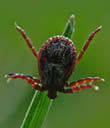Tick Prevention Week
 All visitors to the Countryside should be aware of ticks as the risk of being bitten is growing as climate change extends the range and seasons in which ticks are active. Ticks can carry and transmit a number of diseases, several of which can cause debilitating symptoms in humans. There are no vaccines available to defend against them, so awareness and preventative measures are the best defence.
All visitors to the Countryside should be aware of ticks as the risk of being bitten is growing as climate change extends the range and seasons in which ticks are active. Ticks can carry and transmit a number of diseases, several of which can cause debilitating symptoms in humans. There are no vaccines available to defend against them, so awareness and preventative measures are the best defence.
Top Ten Tips To defend against tick attachment
The best and easiest defence against tick-borne infection is to avoid being bitten. Simple precautions to help you stay safe include:
- Out walking, wear suitable clothing: use gaiters, or tuck long trousers into socks, and choose clothes with elastic or drawstrings at the waist, wrist, and ankle, to help deter ticks from crawling under clothes and attaching. Clothing made from smooth or waxed material is hard for ticks to climb, and light-coloured fabrics make them easier to see. Wearing shorts in tick habitat is an invitation to be bitten!
- Use an insect repellent
- Carry a tick remover
- Walk in the centre of paths: avoid over hanging vegetation at the edge of paths where ticks may be waiting.
- Have a "tick buddy": when planning an excursion into tick habitat, have a designated "tick buddy" to help you check your body. Pay particular attention to the scalp as ticks can easily hide under hair.
- Deter ticks from gardens: careful landscaping of park areas and gardens can help to deter ticks, as they thrive in humid environments and avoid sunny, dry areas. The following tips can help you create a "safe zone".
- Keep pets tick free
- Treat pet accessories with insect repellents
- Groom pets thoroughly
- Don't bring ticks home: take off outer clothes before going in doors.
For more information visit: the Tick Prevention Week website.
Read more about Tick borne and Lyme diseases.
|
Updated: 23 Jan 2024, Content by: CN
|



